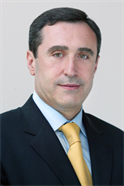
The Artie McFerrin Department of Chemical Engineering at Texas A&M University welcomes two new permanent faculty members, previously associated with the department as visiting professors: Dr. Christodoulos Floudas and Dr. Stratos Pistikopoulos.
Floudas and Pistikopoulos reveal their shared goals in selecting Texas A&M: to contribute, collaborate, and make the department comparable to the top departments in the world, under the shared inspiration of department Head Dr. Naz Karim.

Floudas, a distinguished professor from Princeton University, “[will be joining] forces with the most talented people in the world,” he said, in his department appointment as a chair professor effective February 2015 and in his placement as the director of the Texas A&M Energy Institute. Floudas has served Princeton as the Stephen C. Macaleer ’63 professor in engineering and applied science, and as a professor of chemical and biological engineering. He is a member of the National Academy of Engineering and is a world-renowned authority in mathematical modeling and optimization of complex systems. His research interests lie at the interface of chemical engineering, applied mathematics and operations research. When making the decision for this institutional move, he factored these considerations and more into his choice.
Floudas’ vision for the chemical engineering department is one of reciprocation and enhancement, adding, “It is an opportunity. Not just to create, but to contribute, to elevate the stature.” His efforts will support both the TAMU Energy Institute and a cluster of multi-scale systems engineering for which he will, “lead in establishing these at the highest level.” Floudas was recently selected as a 2014 Thomson Reuters Highly Cited Researcher.
 Pistikopoulos will join the department as a chair professor in January 2015, from the Imperial College in London, U.K. where he has served as a professor in the department of chemical engineering. He is a member of the Royal Academy of Engineering in the U.K. His past research has led the way of theory, development of algorithms and computational tools in multi-parametric programming, explicit model-based predictive control and process optimization under uncertainty, yet he said he was fully certain of his move to TAMU. “The department has tremendous potential to go to the top. The ability and opportunity to build a tremendous process systems engineering powerhouse,” is part of the motivation in coming to Texas, he added.
Pistikopoulos will join the department as a chair professor in January 2015, from the Imperial College in London, U.K. where he has served as a professor in the department of chemical engineering. He is a member of the Royal Academy of Engineering in the U.K. His past research has led the way of theory, development of algorithms and computational tools in multi-parametric programming, explicit model-based predictive control and process optimization under uncertainty, yet he said he was fully certain of his move to TAMU. “The department has tremendous potential to go to the top. The ability and opportunity to build a tremendous process systems engineering powerhouse,” is part of the motivation in coming to Texas, he added.
Pistikopoulos is inspired by the “[significant] initiative for energy and the opportunity to create excellence with the Energy Institute,” he said. The people of TAMU also positively influenced his decision to join forces with the department, noting there is, “Ambition. The people here want to take the university to the top and I want to be there with them.”
Karim said, “Both Drs. Floudas and Pistikopoulos are real ‘giants’ in the field of multi-scale systems engineering. Their presence in the department has already created a significant buzz around the world. We expect to see very high-quality undergraduate and graduate students joining the department, to solve the grand challenges of the future and to enhance the stature of the department in the world. We look forward to seeing many renowned faculty join our team in the near future.”
Both professors offer unique teaching styles, similar to each other in many ways. Each prides himself in the role of mentor. Floudas reflected on his students, “I care about them. It’s a long relationship that doesn’t end after the Ph.D, but throughout their career it continues. Many times, they contribute to my own development.” Floudas will dedicate himself to a three-prong pursuit when he arrives in February. “Research, education and external relationships with industry and government” rank at the top of his priority list.
Pistikopoulos said, “I like to be a role model and to develop very strong and in-depth relationships with my research groups and students.” Pistikopoulos extended that the secret to success, “though it is judged by others,” comes down to being, “Educated properly, having determination, patience and passion.” He added, “Always look at something and see the passion. It’s my driving force.”
The Artie McFerrin Department of Chemical Engineering, established in 1940 has consistently been a leader in chemical engineering education in the United States. This trend continues today where the undergraduate program impressively ranked in 2012-2013 as 12th among public institutions and the graduate program ranked 17th by U.S. News & World Report. Throughout its history and still today, Texas A&M Chemical Engineering is known for educating the highest quality of students, producing engineers who are immediately prepared for industry upon graduation.